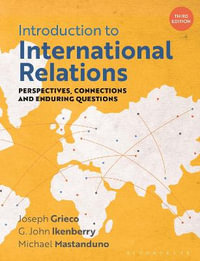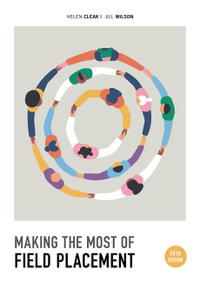
Analyzing Elections
Paperback | 5 September 2006 | Edition Number 1
At a Glance
690 Pages
23.36 x 15.74 x 2.54
Paperback
RRP $87.95
$75.40
14%OFF
or 4 interest-free payments of $18.85 with
orAims to ship in 15 to 25 business days
When will this arrive by?
Enter delivery postcode to estimate
It begins by examining the roles of the basic actors in elections—voters, candidates, parties and interest groups—and the institutional process through which the actors move. The analytical techniques presented in the first part of the book are then applied to questions about the effects of money and the mass media on electoral outcomes, the extent to which elections can control errant officials, and the problems of measuring public opinion and preferences. Special attention is devoted to the unique issues involved in the congressional redistricting as well as presidential primaries and the Electoral College. The analysis is extended to consider the roles played my minor party and independent candidates and the problems minorities face in achieving representation in the American electoral process.
| Acknowledgments | p. xiii |
| How Elections Rule American Politics | p. 3 |
| Bush versus Gore, September 11, and American Elections | p. 3 |
| Actors and Institutions | p. 5 |
| Election Games | p. 8 |
| The Plan of the Book | p. 9 |
| The Message of the Book | p. 12 |
| A Note to the Reader | p. 13 |
| Fundamentals | p. 17 |
| Understanding Turnout | p. 19 |
| Three Things | p. 19 |
| Three Puzzles | p. 21 |
| Consumption versus Investment | p. 28 |
| Togetherness: The Group Investment Benefits of Voting | p. 29 |
| Consumption and Citizen Duty Redux | p. 33 |
| Voting Rationally and Turning Out Irrationally | p. 41 |
| The Forty-Five-Year Lag Revisited | p. 45 |
| The Final Puzzle-Why Did Turnout Decline in the 1970s? | p. 50 |
| What We Know | p. 55 |
| What We Don't Know: Why Turnout Rebounded in 2004 | p. 56 |
| Study Questions and Problems | p. 56 |
| Appendix to Chapter 2 | p. 57 |
| Trends in Voter Mobilization | p. 62 |
| Mobilization Strategies in the 2004 Election | p. 62 |
| The Good, the Bad, and the Institutions | p. 71 |
| Making Voting Cheap and Easy | p. 74 |
| Financing Turnout | p. 84 |
| What We Know | p. 85 |
| What We Don't Know: Candidates and Parties | p. 86 |
| Study Questions and Problems | p. 86 |
| Candidates, Primaries, and Ideological Divergence | p. 90 |
| Brothers in Office | p. 90 |
| Why Moderation Attracts in U.S. Elections | p. 91 |
| Moderation: Virtue or Vice? | p. 96 |
| A Battle for the Left | p. 101 |
| How Parties Affect Candidates' Positions | p. 102 |
| Uncertainty and Extremism | p. 108 |
| Variations in Primary Systems | p. 113 |
| Opening Primaries and Party Control | p. 116 |
| Ambition, Ideology, and Divergence | p. 120 |
| What We Know | p. 124 |
| What We Don't Know: Red States versus Blue States | p. 124 |
| Study Questions and Problems | p. 125 |
| Polarized over Policy or Voting on Valence? | p. 128 |
| A War between the States? | p. 128 |
| The Arguments behind the Polarized View: A Closer Look | p. 137 |
| Income Inequality, Immigration, and Polarization | p. 170 |
| Do Voters Base Choices on Issues or Abilities? | p. 172 |
| What We Know | p. 178 |
| What We Don't Know: What Money Does | p. 178 |
| Study Questions and Problems | p. 179 |
| Money and the Mass Media | p. 183 |
| How Campaigns Are Financed | p. 185 |
| The Desperate Man | p. 185 |
| Who Makes Contributions? | p. 187 |
| Federal Campaign Finance Regulations | p. 190 |
| Giving to Elect or to Receive? | p. 197 |
| Giving to Elect | p. 199 |
| Giving to Receive | p. 202 |
| Evidence on Quid Pro Quo Contributions | p. 207 |
| Coordination and the Decisiveness of Money | p. 209 |
| Policy versus Service Redux | p. 212 |
| What We Know | p. 213 |
| What We Don't Know: Opening Up the Black Box | p. 213 |
| Study Questions and Problems | p. 214 |
| How Campaign Money Affects Voters | p. 217 |
| Inside the Black Box: Indirect Influences | p. 217 |
| Inside the Black Box: Direct Influences | p. 221 |
| Empirical Evidence on Campaign Advertising | p. 231 |
| What We Know | p. 242 |
| What We Don't Know: Other Sources of Information | p. 243 |
| Study Questions and Problems | p. 243 |
| The Mass Media and Voters' Information | p. 247 |
| Candidate Information and the Media | p. 247 |
| A Biased Information Source? | p. 250 |
| The Sources and Effects of Media Bias | p. 258 |
| What We Know | p. 281 |
| What We Don't Know: A Referendum on Whom? | p. 282 |
| Study Questions and Problems | p. 283 |
| The Problems of Incomplete Information in Elections | p. 289 |
| Controlling the Behavior of Elected Officials | p. 291 |
| William Goodling's Unusual Election | p. 291 |
| A Return to Citizen Legislators | p. 292 |
| The Secret World of Incumbents | p. 292 |
| What the Voters May Not Know about Incumbents | p. 294 |
| Controlling Incumbents by Getting Information | p. 299 |
| Controlling Elected Officials on the Basis of Little Information | p. 301 |
| Empirical Evidence | p. 304 |
| Retrospective Voting and the Economy | p. 306 |
| Retrospective Voting and Parties | p. 310 |
| Should Incumbency Be Limited? | p. 312 |
| The Puzzle of the Increase in Term Limits | p. 316 |
| Voters' Changing the Electoral Calendar | p. 317 |
| Referenda and Initiatives | p. 321 |
| Elected versus Appointed Officials | p. 323 |
| What We Know | p. 326 |
| What We Don't Know: What Voters Want | p. 327 |
| Study Questions and Problems | p. 328 |
| Measuring Public Opinion | p. 332 |
| Psephology Failures | p. 332 |
| Public Opinion Polls and Elections | p. 334 |
| Show Me the Money | p. 347 |
| Election Night and Projecting Winners | p. 353 |
| Forecasting Elections before Campaigns Begin | p. 368 |
| What Do We Learn about Elections from Psephology Failures? | p. 374 |
| Do Elected Officials Read Polls? | p. 374 |
| Retrospective Voting and Public Opinion Polls | p. 377 |
| What Do Public Opinion Polls Tell Elected Officials? | p. 381 |
| What We Know | p. 386 |
| What We Don't Know: Other Reasons Why Goodling's Election Was Special | p. 387 |
| Study Questions and Problems | p. 388 |
| Federal Elections | p. 395 |
| Congressional Elections | p. 397 |
| Trying to Make a Difference | p. 397 |
| Apportionment and Membership of the House of Representatives | p. 398 |
| Redistricting | p. 402 |
| Gerrymandering | p. 407 |
| Does Gerrymandering Give Incumbents an Advantage? | p. 423 |
| The Decision to Run | p. 426 |
| Senate Elections | p. 436 |
| Are Congressional Races Special? | p. 438 |
| Not All Members Are Equal | p. 439 |
| Seniority, Elections, and Incumbency | p. 441 |
| Party Control, Positions of Power, and Upward Political Mobility | p. 444 |
| What We Know | p. 446 |
| What We Don't Know: Moving Down the Street | p. 446 |
| Study Questions and Problems | p. 447 |
| Presidential Primaries | p. 452 |
| Skipping Around or Sitting in Place? | p. 452 |
| What It Takes to Get on the Ballot in the Primaries | p. 453 |
| Hyperspeed | p. 455 |
| What It Takes to Get Nominated | p. 458 |
| How the Current System Works | p. 471 |
| How the Current System Works: The Evidence | p. 484 |
| Views of the State of Primaries | p. 487 |
| What We Know | p. 489 |
| What We Don't Know: The Next Step | p. 489 |
| Study Questions and Problems | p. 490 |
| Presidential Elections | p. 494 |
| Going West | p. 494 |
| How the Electoral College Works | p. 495 |
| The Electoral College and Campaigning | p. 499 |
| The Electoral Vote and Government Spending | p. 513 |
| Voters and Divided Government | p. 515 |
| What Happened to the Patient's Bill of Rights? | p. 534 |
| More Checks and Balances | p. 535 |
| What We Know | p. 537 |
| What We Don't Know: Other Parties and Candidates | p. 538 |
| Study Questions and Problems | p. 538 |
| Challenging the Majority | p. 543 |
| Minor Parties and Independent Candidates | p. 545 |
| Winning by Division | p. 545 |
| Voters' Choices in Three-Candidate Elections | p. 546 |
| Choosing Whether to Party | p. 550 |
| Moving to More Than One Dimension | p. 552 |
| Can Minor-Party or Independent Candidates Succeed in U.S. Elections? | p. 557 |
| How Influential Are Minor-Party and Independent Candidates? | p. 562 |
| Do Voters Vote Strategically? | p. 568 |
| Party Labels as Information and Coordination Devices | p. 573 |
| Nonpartisan Elections, Majority Requirements, and Coordination | p. 574 |
| Not Unique but Rare... | p. 579 |
| The Implications for Policy Choices | p. 580 |
| How Failing to Support David Worley Hurt the Democrats in 2000 | p. 584 |
| What We Know | p. 585 |
| What We Don't Know: The Major Political Parties and Civil Rights | p. 586 |
| Study Questions and Problems | p. 588 |
| Minority Voters and Representation | p. 592 |
| The Dilemma of Representation | p. 592 |
| What It Was Like | p. 594 |
| The South Today | p. 595 |
| The Current Rise in Diversity | p. 599 |
| Defining Minority Representation | p. 600 |
| Vote Denial | p. 602 |
| Vote Dilution | p. 608 |
| Vote Dilution, the Fifteenth Amendment, and the Voting Rights Act | p. 616 |
| Majority-Minority Districts and the Redistricting Debate of the 1990s | p. 618 |
| Majority-Minority Districts and Other Minorities | p. 621 |
| Are Majority-Minority Districts Good for Minorities? | p. 625 |
| The Future of Redistricting | p. 632 |
| Vote Denial Today | p. 634 |
| What We Know | p. 637 |
| Study Questions and Problems | p. 637 |
| The Future and Analyzing Elections | p. 641 |
| The 2008 Presidential Contest | p. 641 |
| The Message and What We Know Redux | p. 642 |
| References | p. 645 |
| Index | p. 673 |
| Table of Contents provided by Ingram. All Rights Reserved. |
ISBN: 9780393978292
ISBN-10: 039397829X
Series: New Institutionalism in American Politics
Published: 5th September 2006
Format: Paperback
Language: English
Number of Pages: 690
Audience: College, Tertiary and University
Publisher: W W Norton & Company
Country of Publication: US
Edition Number: 1
Dimensions (cm): 23.36 x 15.74 x 2.54
Weight (kg): 0.88
Shipping
| Standard Shipping | Express Shipping | |
|---|---|---|
| Metro postcodes: | $9.99 | $14.95 |
| Regional postcodes: | $9.99 | $14.95 |
| Rural postcodes: | $9.99 | $14.95 |
How to return your order
At Booktopia, we offer hassle-free returns in accordance with our returns policy. If you wish to return an item, please get in touch with Booktopia Customer Care.
Additional postage charges may be applicable.
Defective items
If there is a problem with any of the items received for your order then the Booktopia Customer Care team is ready to assist you.
For more info please visit our Help Centre.
You Can Find This Book In

Introduction to International Relations
3rd Edition - Perspectives, Connections and Enduring Questions
Paperback
RRP $102.95
$85.90
OFF






















